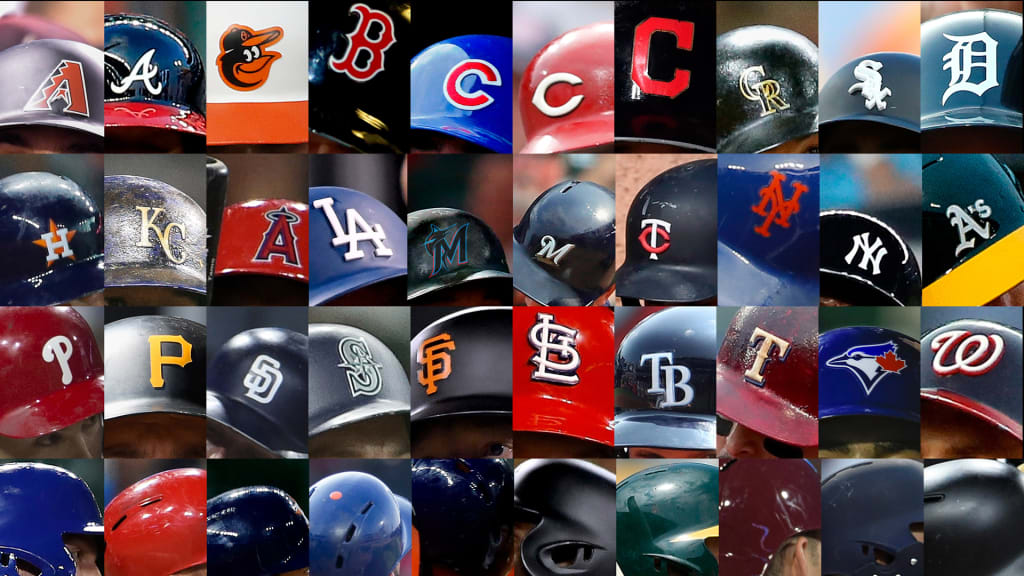
In advance of the MLB Draft, MLB.com is taking a look back at each club's Draft history and revisiting stories of players who were originally selected by one team but didn't sign, ultimately blossoming with another.
Below is a look at the most notable Draft "what ifs" for all 30 Major League clubs:
American League East
Blue Jays: Kris Bryant, 18th round, 2010
Bryant could have been a Canadian hero, similar to how Josh Donaldson was during his Toronto tenure at the hot corner, had the Blue Jays been able to convince Bryant to forgo his commitment to the University of San Diego.
Orioles: Cliff Lee, fourth round, 2000
Four-time All-Star and former Cy Young Award winner Lee was drafted twice before the Expos signed him as a fourth-rounder in 2000. After declining to join the Marlins when they took him in the eighth round in 1997, Lee saw his Draft stock tumble all the way to the Orioles' 609th overall selection in Round 20 in '98.
Rays: Andrew Miller, third round, 2003
The Rays were hoping Miller would be the anchor of their bullpen for more than a decade but couldn't come up with the money to pry him away from his commitment to the University of North Carolina.
Red Sox: Mark Teixeira, ninth round, 1998
If the Red Sox had their way in the 1998 Draft, Teixeira would have been begun his career playing on their side of baseball's most storied rivalry. Boston selected the eventual Yankees star, then an 18-year-old Maryland prep prospect with a scholarship to Georgia Tech, in the ninth round.
Yankees: Gerrit Cole, first round, 2008
The Yankees were among the clubs linked to Cole in the winter of 2018, but the right-hander, now excelling with the Astros, had an opportunity to don pinstripes much sooner as the 28th overall pick in 2008. Instead, he opted to honor his commitment to UCLA.
American League Central
Indians: Tim Lincecum, 42nd round, 2005
What if the Indians' intimidating pitching staff in the 2000s -- featuring a pair of ace left-handers in CC Sabathia and Lee -- had also featured an in-his-prime Lincecum? That scenario could have played out had the Indians been successful in luring Lincecum away from the University of Washington as a 42nd-round pick in 2005.
Royals: Deion Sanders, sixth round, 1985
Could the Royals have had two outstanding two-sport athletes in the same outfield in Bo Jackson and Sanders in the late 1980s? It came very, very close to becoming a reality.
Tigers: Ozzie Smith, seventh round, 1976
The Tigers already selected a pair of soon-to-be Hall of Famers as part of their 1976 Draft in Alan Trammell and Jack Morris. There was, however, a third headed to Cooperstown from that class, though he never played a game for Detroit. The Tigers drafted Smith in the seventh round, but the eventual 15-time All-Star shortstop opted to finish his education at Cal Poly.
Twins: George Springer, 48th round, 2008
Long before he earned World Series Most Valuable Player honors with the Astros in 2017, Springer passed on an opportunity to begin his career in the Twins organization as the team's 48th-round pick in 2008. Instead, he dramatically improved his Draft stock with a successful collegiate career at the University of Connecticut.
White Sox: Eric Gagne, 30th round, 1994
Gagne is "the one who got away" for the White Sox. John Tumminia, a scout of 32 years, was intrigued by the raw 18-year-old hurler from Quebec, but not many in the organization shared his enthusiasm. It was frustrating enough that Tumminia considered quitting.
American League West
Angels: Buster Posey, 50th round, 2005
Even before he converted to catcher, the Angels recognized the great baseball mind that has made Posey one of the game's top backstops. The Angels took Posey, then a right-handed pitcher, in the 50th and final round of the 2005 Draft, but knew he was unlikely to sign due to his commitment to Florida State University.
Astros: Jason Varitek, 23rd round, 1990
The Astros made a six-figure offer to Varitek well exceeding his status as a 23rd-rounder in 1990 in hopes of luring the catcher out of his commitment to Georgia Tech. Had it been successful, Houston may have never traded for Brad Ausmus, who went on to catch more games than any other player in franchise history.
Athletics: Aaron Judge, 31st round, 2010
As a prep prospect out of Linden, Calif., in 2010, Judge hadn't yet displayed the power that's turned him into a big league star. Still, he was on the professional radar as the A's 31st-round pick before continuing his development at Fresno State.
Mariners: Barry Zito, 59th round, 1996
In what was a pitcher-heavy Draft for the Mariners in 1996 -- Seattle selected 34 pitchers overall, including its first five selections that year -- only first-round pick Gil Meche (147 games for the Mariners over six seasons) appeared in more than 18 Major League games for them. Take the 2001 Mariners -- who won an MLB-record 116 games -- and add Zito, who posted a 3.17 ERA for the A's from 2001-03 and won an AL Cy Young Award in the process. It just wasn't meant to be.
Rangers: Barry Zito, third round, 1998
The Rangers were one of two American League West teams -- along with the Mariners -- that drafted Zito before he eventually went pro as a first-round pick of the A's in 1999. Had either team been successful, it may have changed the shape of the division for much of the next decade.
National League East
Braves: Anthony Rendon, 27th round, 2008
Since Chipper Jones retired after the 2012 season, the Braves have yet to find a long-term successor at third base. That could have changed, however, had Atlanta successfully convinced Rendon to take over for his childhood idol rather than play collegiately in his hometown at Rice University.
Marlins: Charlie Blackmon, 28th round, 2004
Blackmon has emerged as an All-Star in the Rockies' outfield, but coming out of high school, the Georgia product was projected as a slender left-handed hurler. The Marlins took a flier on the prep pitcher in the 28th round in 2004.
Mets: Cal Eldred, Scott Erickson, Todd Jones, John Olerud, 26th, 27th, 36th and 41st rounds, 1986
In the late rounds of the 1986 Draft, the Mets selected four players who would go on to have productive Major League careers in pitchers Eldred (26th round), Erickson (36th) and Jones (41st), and first baseman Olerud (27th). None of them signed with New York.
Nationals: Russell Martin, 35th round, 2000
Martin spent four seasons playing in his native Canada for the Blue Jays, but the veteran backstop could have played even closer to home much sooner. Then a 17-year-old utility player out of high school in Montreal, Martin was drafted by the Expos in the 35th round in 2000, just a few years before the franchise relocated to Washington.
Phillies: J.D. Drew, first round, 1997
The aftermath of the Phillies making Drew the No. 2 overall pick in the 1997 Draft remains one of the wildest stories in the franchise's history -- one that includes a record-breaking bonus demand, a postal controversy, threats of lawsuits, a private investigator and rewritten language in the Collective Bargaining Agreement.
National League Central
Brewers: Jake Arrieta, 26th round, 2005
Arrieta is among the Brewers' greatest Draft "what if" cases. Milwaukee had an opportunity to sign the right-hander as a 26th-round pick in 2005 before he went to Texas Christian University and later began his professional career with the Orioles.
Cardinals: Max Scherzer, 43rd round, 2003
Scherzer would have loved to pitch for his hometown Cardinals, but he wasn't yet considering going pro at the time St. Louis drafted him in the 43rd round in 2003, a decision that proved fruitful as he developed into one of the top pitching prospects in three years at the University of Missouri.
Cubs: Mark Langston, 15th round, 1978
Langston wasn't a highly touted prep prospect in 1978, but the Cubs were intrigued enough to take him in the 15th round. The future big league pitcher opted for college instead, boosting his Draft stock with three years at San Jose State.
Pirates: Trea Turner, 20th round, 2011
The Pirates aced the 2011 Draft, selecting Cole, Josh Bell and Tyler Glasnow among several prospects who went on reach the Major Leagues. One of those players was the Nationals' everyday shortstop, Turner, who, despite Pittsburgh's best efforts, was set on attending North Carolina State and never close to signing.
Reds: Andrew Benintendi, 31st round, 2013
Benintendi could have played for his hometown Cincinnati Reds when they selected him in the 31st round in 2013, but the outfielder already planned to honor his commitment to the University of Arkansas, where he became the school's first National Player of the Year.
National League West
D-backs: Ian Kinsler, 29th and 26th rounds, 2000 and 2001
Kinsler slipped through the D-backs' fingers twice after the club selected him in the 29th round in 2000 and again in the 26th round in 2001. It's served as a valuable lesson for Mike Rizzo, now the Nationals' general manager, each Draft season.
Dodgers: Paul Goldschmidt, 49th round, 2006
The Dodgers' 2006 Draft class helped shape the last decade of the franchise by bringing franchise star Clayton Kershaw to Los Angeles. Imagine what might have been if they had signed their under-the-radar 49th-round pick, Goldschmidt, who played high school baseball with Dodgers scout Chris Smith's son.
Giants: Barry Bonds, second round, 1982
Bonds' 15-year run with the Giants could have started much earlier than when he signed with the club as a free agent in 1992. San Francisco selected the lefty slugger out of high school in the second round of the 1982 Draft. Bonds and the Giants couldn't reach an agreement on the signing bonus, and Bonds went on to win the first two of his seven Most Valuable Player Awards with the Pirates.
Padres: Todd Helton, second round, 1992
Helton made a career of tormenting the Padres, batting .330/.423/.537 in 241 games against San Diego, but that all could have been avoided. Helton was committed to playing quarterback at the University of Tennessee, but if he had known Peyton Manning was headed there with him, he may have been a Padre.
Rockies: Chris Sale, 21st round, 2007
The Rockies narrowly missed out on drafting a future ace in 2007 when they couldn't come to terms on an agreement with Sale, then a prep prospect. Colorado drafted Sale in the 21st round, three years before he blossomed into the 13th overall pick and an eventual seven-time All-Star.
